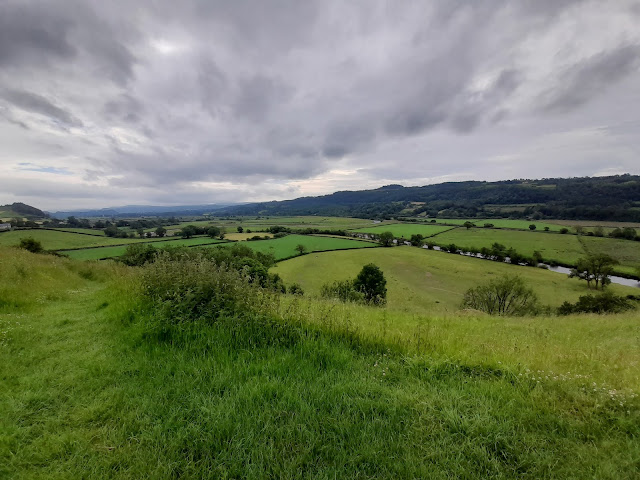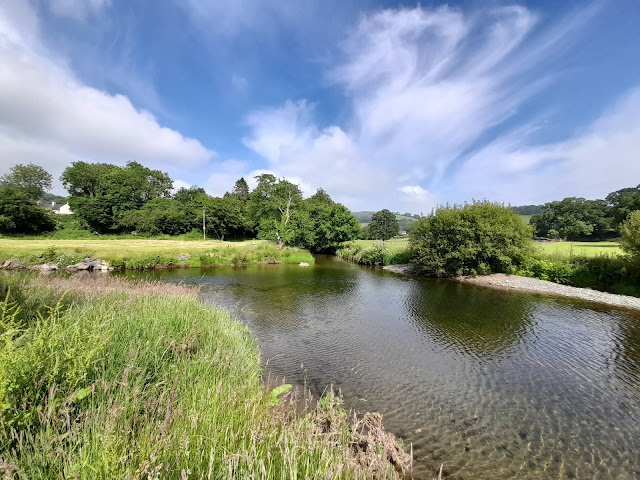River Cothi, Wales
I was meant to visit France last week to fish the chalkstreams of Normandy, but Covid put paid to the trip. Bound by the confines of mainland Britain, Wales was hastily chosen as a substitute and a log cabin in Camarthenshire came at an attractive rate. There was a time - a decade ago - when I fished in Wales frequently, but that was in mid Wales and mostly in the border region with England known as the Marches. I'd never been to Camarthenshire in the south west of Wales before, but knew it to be a county dominated by two famous sea trout rivers, the Towy and its tributary, the Cothi.
The M4 motorway was at a standstill in several places and we were delayed by several hours in reaching Wales. Not long before our destination the route took us over the Towy where it flowed beneath the ruins of Dryslwyn Castle, where in 1287 the English brought an army of 11,000 men to lay siege to the castle, and eventually capture it from a rebellious Welsh noble. One look at the broodingly dark Towy and I knew it was too large and featureless for the likes of me. I wouldn't know where to begin to fish such a river.
 |
| The Towy valley |
The Cothi flowed in the steep valley beneath our log cabin, smaller than the Towy, but astonishingly clear in a sense that would rival any chalkstream. I instantly liked the look of it and settled on a stretch of the upper river under the control of the Dolaucothi Arms, a pub at the village of Pumsaint. The pub is built on the site of a Roman fort which once guarded a nearby gold mine. I did a recce to the pub on the Sunday after our arrival. From the beer garden I watched the Cothi flow lazily by at the far end of a sheep paddock, and then enjoyed a meal of Welsh faggots washed down with a local Gower ale. The landlord warned me that he hadn't heard of a sea trout or salmon being caught this far upriver in years. The runs of sea trout and salmon today are mere shadows of what they once were in the glorious heyday of these rivers, a sad fact common to all the rivers of Britain. I reassured him that I was only interested in the resident brown trout and from my research, I knew them to be diminutive in size. I wanted to fish the Cothi for its sense of angling history more than anything else.
 |
| Delicious Welsh faggots |
I returned to the pub at 09.30 on Thursday morning, when the weather forecast was better, and purchased my day ticket for the princely sum of £10. At the landlord's suggestion I headed upstream from the pub. When I first saw the water through the trees I could tell the river was running very low and knew the day would be a challenge. I struggled for the first hour, my mere presence and casts sending the tiny fish fleeing from a distance. I had to adjust my approach, turning to memories of fishing these thin ribbons of water in Wales a decade ago. Stealth is the key to winning the battle. I slowed down my movements, and approached the water on my knees. The choice of fly mattered little in these acidic waters, because the trout would feed opportunistically on any reasonable looking morsel crossing their path.
My black Klinkhåmer began to elicit several lightning fast rises from trout, but the trout were tiny and difficult to hook. In a pool shrouded by the shade of alder trees on each bank, a trout rose against the left bank, where exposed tree roots offered it a refuge to flee at the first sign of danger. When the rise came to my fly, I struck with the speed of a rattlesnake, and was overjoyed when the hook at last held true.
 |
| My first Cothi trout |
With a formula of extreme stealth and setting the hook with lightning speed, I began to catch more trout. They were all small and delicate, tiny wisps of life in a harsh world. I rose more trout than I was able to hook though. I did hook a veritable giant of around 9 or 10 inches long, but the hook dislodged when it leapt a foot clear from the water, shaking its body furiously. I was devastated to lose such a prize! It felt like 'proper' fly fishing.
I sat on a flat boulder midstream and ate a sandwich in the company of white throated dippers and grey wagtails. After the kingfisher, the dipper is my favourite riverine bird. It makes a sweet sound and dives beneath the water to compete with trout by hunting nymphs. They aren't found in the South East where I now live, so it was a pleasure observing them again. A buzzard was chased down the river's corridor towards me by another smaller bird (in the commotion I couldn't tell if it as a blackbird or small crow). When the buzzard saw me, late, it and the smaller bird wheeled away from the river through the trees. As I came to the end of my sandwich, I watched a mouse scurry through the bankside vegetation, pull off a leaf from what I took to be cow parsley, and disappear with it down a hole in the bank. Nature is so readily apparent when you sit still and simply observe.
 |
| A trout from the Twrch |
I walked downstream, beneath the A482 bridge, to the pool I had seen from the pub garden. It was a deep junction of the Cothi and its tributary, the Twrch. If there was to be a sea trout this far from the coast, the junction pool looked a likely place. I'd return to it later, and followed the Twrch upstream for a short way, catching two brown trout and failing to hook many more which rose to my fly.
 |
| The Junction Pool |
I returned to the junction pool and replaced my dry fly with the heaviest nymph in my box, and to this nymph I added 10" of tippet and a size 20 pheasant tail, without a bead. On my first drift the indicator dipped and I lifted my rod into an unusually heavy resistance. Surely not a sea trout, I dared to dream? The answer soon became apparent - there was a trout on each of my hooks! The trout on the largest nymph soon came off in the melee and I netted the other, chuckling at myself for thinking it was a sea trout. I decided to call it a day at that point.
 |
| My final Cothi trout |
Anyone who has visited Wales will know that its people have a proud heritage and culture. I was surprised to hear how commonly the Welsh language is spoken in the streets and shops of Camarthenshire, and I returned to England with the pleasing sense of having visited a 'foreign' country. It was a good break.



Fantastic, looking stream with the scenic countryside. So impressed with the image of the large trees along the stream banks. It would not bother me if I didn't land a trout there. Thanks for sharing
ReplyDeleteThanks, Bill. Wales is a stunning country. I really should visit more.
DeleteHi Justin, good to see that you were back in Wales!
ReplyDeleteI do miss your trips to the Welsh marches!
The history sounds lovely.
Thanks, Nick. It was great to return. I will always have an affinity with Wales and its tremendous fishing!
Delete